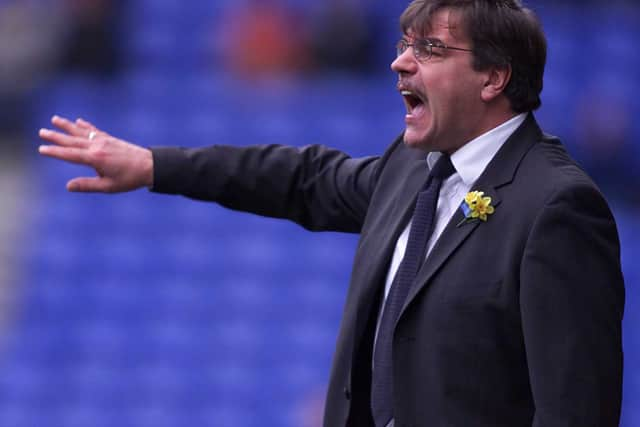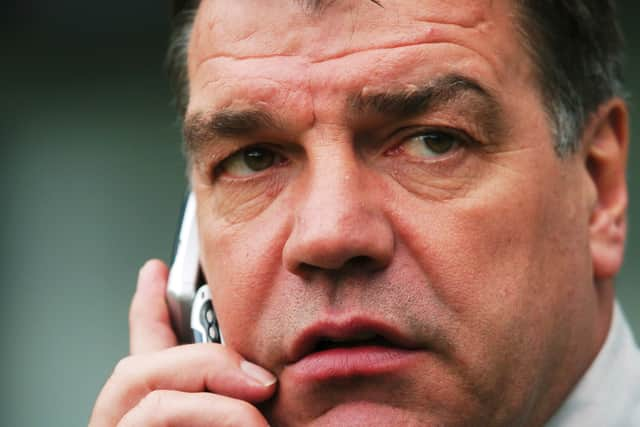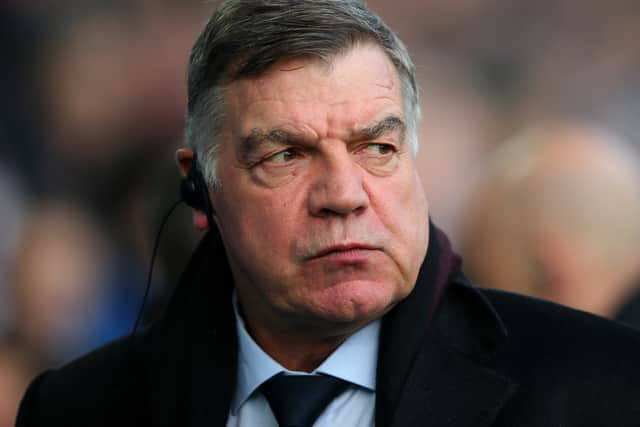Have Leeds United brought in a relic or an underappreciated innovator? Looking back at Big Sam’s Bolton
and live on Freeview channel 276
“If my name was Allardicio, I’d be right at the top” – not a meme, but the words of Sam Allardyce, just a few minutes into a recent episode of his podcast, almost parodically named ‘No Tippy Tappy’. Big Sam is either blessed with immense self-awareness, or cursed with its complete absence. Whether he has taken it on willingly or not, the new Leeds United manager is burdened by a reputation he will never shake.
A long ball merchant, a dinosaur, a throwback, a relic. A relegation firefighter, his career spent largely behind a glass case embossed with the phrase “break only in case of emergency”. The figure of fun who spent most of his career complaining that he would never be given the big jobs, only to blow his chance over what appeared to be a pint of wine the moment it finally arrived – and now the manager of a club who have somehow transitioned, in 14 short months, from the high-pressing, constantly-attacking philosophy of Marcelo Bielsa to a dour and self-defensive acknowledgement of the need for survival at all costs.
Advertisement
Hide AdAdvertisement
Hide AdBut of course, little of that is fair. Allardyce was once among the most progressive managers in the league, at the forefront of the scientific analysis of football and head coach of a Bolton Wanderers side who sailed far above their station under his tutelage. And, of course, we forget another truth about his time in Greater Manchester – Bolton were, at their best, quite a lot of fun…


Allardyce was a pioneer in the use of statistical analysis in the Premier League. When Bolton were promoted, they became only the second club in the league – after Manchester United – to make use of Prozone, the analytical tool that would become standard across professional British football. He used that analysis to conjure up tenets that informed the way his team played the game – scoring first provided a 70% chance of victory, set pieces should account for at least a third of goals scored (it was often closer to half), they had an 80% chance of winning if they outran their opponents at speeds greater than 5.5 metres per second. The structures Allardyce developed seem almost absurdly precise, but they allowed a team built on a Championship budget to compete effectively in the top tier, first successfully surviving relegation and then finishing in the top eight for three successive seasons and campaigning in Europe.
He was also a proponent of a very old idea – the concept of the Position Of Maximum Opportunity, or POMO, a theory developed by pioneering football statistician Charles Reep. Reep’s ideas, founded in the fifties and utilised by clubs such as Wolverhampton Wanderers and Huddersfield Town back when they were both a distinctly big deal, were founded on deeply dodgy mathematics and have essentially been disproven in recent years, but still had a profound impact on English football and informed the tactics of many managers, including national team coach Graham Taylor and Ireland head coach Jack Charlton.
The basic concept was that getting the ball quickly, with the minimum number of passes, to certain high-impact areas maximised the chances of scoring goals. The numbers behind the concept didn’t add up, but they sowed the seeds of the kick-and-rush football that defined English football for decades, even into the early Premier League era. Allardyce used the principle as the basis for his own understanding of POMO, but rather than blindly following Reep’s calculations, he used in-depth analysis to expand upon the basic concepts and improve them.


Advertisement
Hide AdAdvertisement
Hide AdSo far, so dour, of course. Long ball football and disciplined defensive positioning were at the heart of Allardyce’s tactics at Bolton and became the guiding principles that he applied to each of his subsequent postings. These were the elements of the Big Sam Style that drew so much criticism from purists, that induced the ire of opposing managers whose flashier teams had fallen to little old Bolton – José Mourinho memorably described their methods as “football from the nineteenth century”. That his tactics received so much opprobrium frustrated Allardyce himself – as he said in his autobiography, “when they hit a 50-yard ball it was a cultural pass; when we did it, it was a hopeful hoof."
And he had a point. Bolton may have been built on solid if uninspiring foundations, but Allardyce didn’t want them to simply play football by the long-ball rote. That’s why he brought in that long list of thrilling veterans that brought flair and culture to proceedings – Youri Djorkaeff, Jay-Jay Okocha, Iván Campo, Stelios Giannakopoulos, and many more. The idea was always to add innovation and trickery to elevate a sound tactical grounding – and it worked that way far more often than credit is given for.
Ask Ray Parlour if he found Bolton a little dull to play against when Okocha was flicking the ball backwards over his head at Highbury. Check in with Charlton Athletic and see whether they thought Djorkaeff’s bicycle kick into the top corner was too turgid. Have a chat with any full-back who found themselves scurrying backwards to intercept one of Campo’s raking passes. Bolton were boring when they needed to be, and determined to give little away, and when the best option was to play it up quickly to Kevin Davies, they did it, sure - but they had a string of mesmerising wingers and supporting midfielders to make use of all those knock-downs and get on the end of those long passes into the corner. Route one was in there, yes, but it was always married efficiently to elegance. And it worked.
As, of course, it worked at Blackburn Rovers, Sunderland, Everton, West Ham United and Crystal Palace. It wasn’t always an edifying spectacle, and he wasn’t always around long enough – or supported by a sufficiently savvy scouting system – to bring in the players who could take the fundamental game he made his teams play up a notch on the spectacle scale. But he always did the same thing – solidify the team, get them working hard and in unison, keep them up. The rest could come later, but he always tried to get there.
Advertisement
Hide AdAdvertisement
Hide AdIt’s also indicative of Allardyce’s qualities as a manager that so many former players are ready to sing his praises years after the glory days of Bolton have passed into memory. Campo said after his retirement that Allardyce “had faith in me and taught me to be a better, more mature player” – high praise from a man who spent nearly five years at Real Madrid and played under Vicente del Bosque. Stelios said after his playing days were done that “my house back in Greece is full of memories [from Bolton]… I have the club in my heart.” Players weren’t just willing to play for that Bolton side, they loved it.
And that may be in part because he looked after them in a way few managers did at the time. He was one of the first managers to employ a sports psychologist to tend to his charges’ mental well-being – indeed, Everton had never had one on the staff until Allardyce was appointed in 2017 – and used the same analytical tools that informed his tactics to look after their physical conditioning and nutrition in a way that has since become standard but was unusual in an era when football had barely moved on from half-time oranges and post-training drinking sessions. He cared for his players and found new ways to look after them. It’s no wonder he inspired so much loyalty from those who played under him at the old Reebok Stadium.


Of course, it is unlikely that he will allow his Leeds side to play with excessive swagger over the next four games, but then it isn’t swagger that they need right now. They are above the relegation zone by goal difference alone. They need someone to get them organised, someone who knows how to eke out a few unlikely results, who knows how to motivate and man-manage his players. Allardyce does all of that, and that’s why he’s been such an effective firefighter for so long. If his tenure ends up extending beyond those first four games – unlikely, perhaps, but at least somewhat possible if he does save Leeds from the drop – he may be able to bring a little bit of the spirit of Okocha and Djorkaeff to proceedings. It has always been unfair to suggest that his management begins and ends with the long ball.
And, of course, it’s plausible that Allardyce can’t do it this time. He has been out of management for two years since his last, failed battle against relegation with West Bromwich Albion. Perhaps he hasn’t been able to keep his ideas up-to-date as the Premier League evolves and new tactical nuances come to bear. Maybe he won’t have time to inculcate the work ethic and positional responsibility that he demands into his new charges, whose current defence has more holes than a second-hand sieve. And, if he does hang about, he may not be able to replicate those stunning budget signings that lifted his team, not in the era when high-class players nearing retirement are more liable to look at lucrative options in the Middle East or the MLS.
We want your feedback on 3 Added Minutes - details here
Advertisement
Hide AdAdvertisement
Hide AdMaybe he gets everything right but Leeds still go down. Their run-in, beginning with Manchester City on Saturday, is brutal. To survive may well take something so special that nobody could manage it. Leeds may have made the right call but left it too late.
Or perhaps the final analysis will suggest that he is something of a relic after all – but if that’s the case, he at least deserves to be remembered as an innovative force in football, even if he could be a spent one now. And it’s only fair to recognise that there’s a reason he’s been trusted by so many clubs with salvaging a dire situation. Leeds haven’t got too much time, but it will tell.
Comment Guidelines
National World encourages reader discussion on our stories. User feedback, insights and back-and-forth exchanges add a rich layer of context to reporting. Please review our Community Guidelines before commenting.
